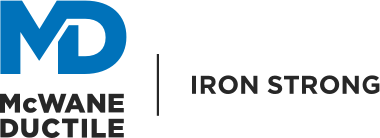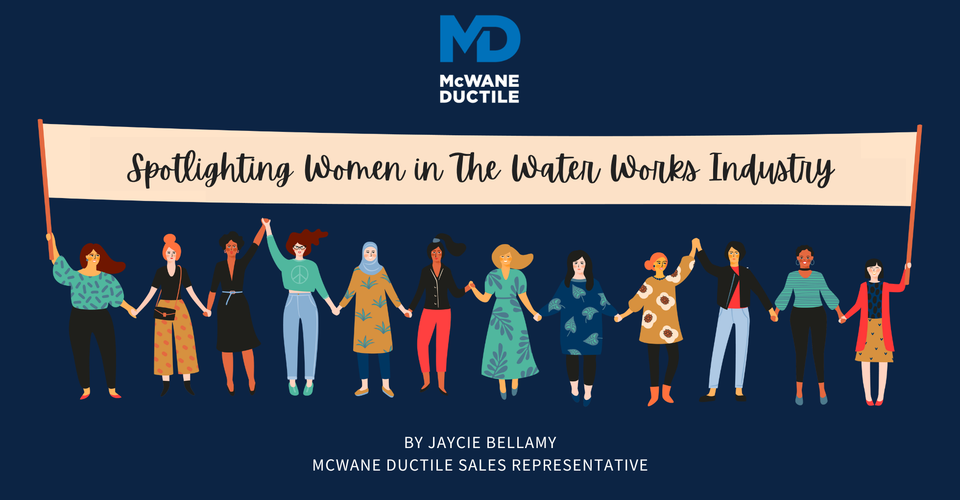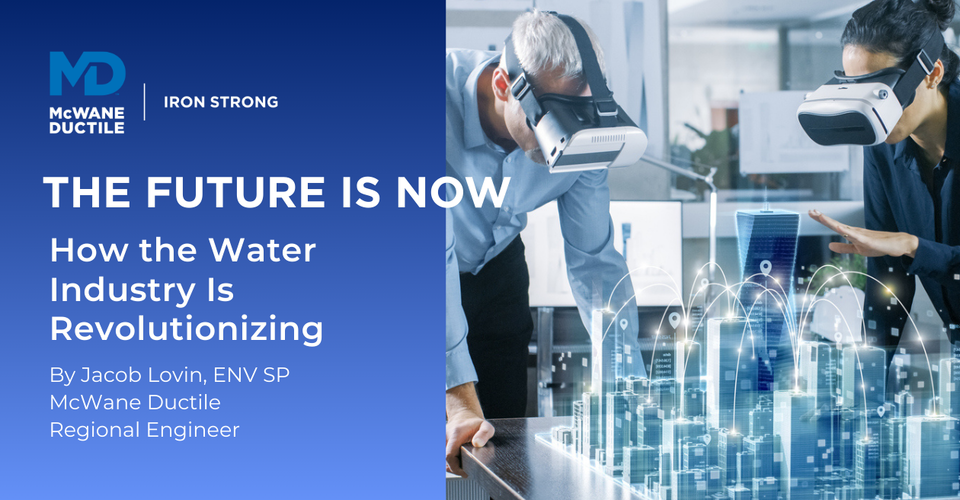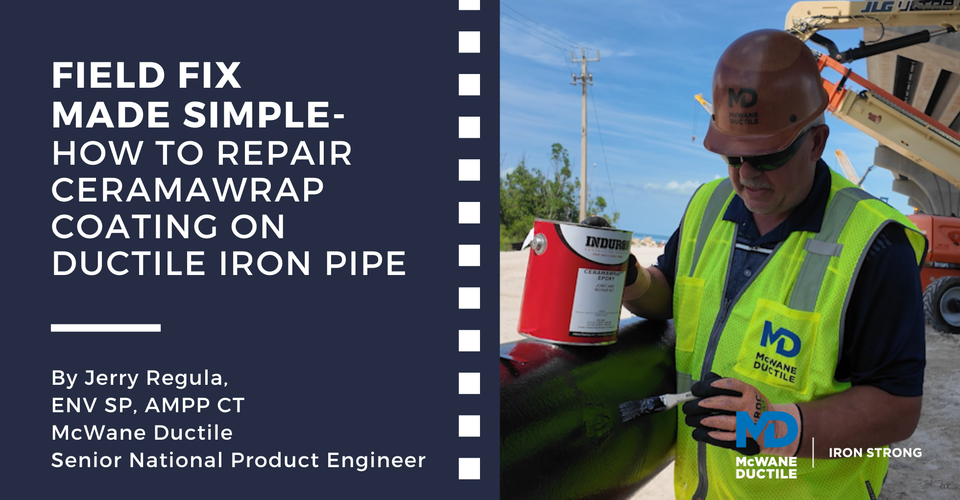Did you know that fewer than 1 in 5 professionals in the water industry are women? 1 In all Science, Technology, Engineering, and Math (STEM) fields, women only account for 26% of the total representation.2 As a female, I entered the water and wastewater industry with a degree in Mechanical Engineering from Tennessee Tech University. With the data points listed above, it would be safe to assume my college classes were primarily male-filled, and in my current role as a sales representative for McWane Ductile, many offices I visit follow that trend as well. Being a woman of STEM in the water industry, these statistics did not necessarily surprise me. However, in my short time in the business, I've noticed that the women representing water and wastewater are strong role models who continue empowering other women to join and become active industry members. This inspired me to speak to three women who stand out as leaders in waterworks and gather insight into their various roles and experiences in bringing clean water to their communities.
Q & A with Three Women Leaders
I asked three inspiring women to participate in a casual question-and-answer session, and our conversation focused on these three topics:
Question 1: "How long have you been in the industry, and what kept you interested?"
Question 2: “How have you seen the involvement of women in the industry change?”
Question 3: “Has there been a female, in the industry or outside, to inspire you to accomplish what you have?”
Chelsea Boozer, Executive Director, Rogue Water Lab
In addition to her work with the nonprofit Rogue Water Lab, a communications hub for all things water-related, Chelsea Boozer serves on the American Water Works Association (AWWA) Executive Committee, Board of Directors, AWWA's Water Utility Council, and Young Professionals Committee. She previously was the Government Affairs Manager for Central Arkansas Water, managing regionalism, stakeholder engagement, and government relations. Chelsea also founded the Arkansas Water Young Professionals Network statewide, helping grow it to more than 500 members over a year.

STARTING OUT: I've been in waterworks now for six years. No other profession is as critical to public health, economic development, and quality of life. Water service providers aid in limiting the spread of pandemic diseases. They keep hospitals and schools running. The quality, affordability, and resiliency of water service can recruit businesses to locate in your town and bring with them jobs and tourism. When a community's water system is healthy and thriving, the community is healthy and thriving. Empowering, inspiring, and equipping utilities to engage and collaborate with their consumers to bolster public trust so that we can tackle the sector's infrastructure, workforce, regulatory, and funding issues is honestly a dream job. I love the new possibilities of working with partners daily to make the world a better place through better water.
CHANGES: I came into the industry at a time when a woman was president of the largest water association in the world. I've seen utilities and companies take intentional steps to diversify our workforce – not just to check a box, but because they understand the benefit and value of diversity. Having a diverse group of people at the table is like having the answer key to every problem that comes your way. The more viewpoints you have when thinking of a possible solution, the better your chance of getting the solution right. While we should pause and recognize progress, we must confront the fact that our industry has more work to do to create a space where everyone belongs, is supported, can thrive, contribute, and lead.
INFLUENCES: My first woman role model in the industry was Melissa Elliott, now Executive Vice President at Raftelis. She was the incoming AWWA president when I met her at my first conference. My role then was in communications; she was one of the go-to water communications experts. She welcomed my outreach whenever I had a question or sought advice, and what they say about seeing yourself represented in leadership is true. Here was this female communicator who was leading the National Association of an industry most commonly associated with male engineers. One of my other biggest inspirations is Ji Im. She's a Principal Environmental Engineer at CDM Smith. I've never met someone so willing to advocate for others – and I mean a STRONG advocate! Ji speaks up for what she believes in, fights for the little person, and always attempts to right what she believes is wrong. More than that, she wants to lift others and connect them to opportunities, and at the young age of 33, she is already a sought-after mentor by many. Melissa and Ji are both trailblazers.
Lisa Coakley, Co-Owner, Coakley Company Inc.
Lisa Coakley is the co-owner of Coakley Company, Inc. in Hot Springs, Arkansas, a utility and excavating contractor focused on construction management and value engineering. Lisa started her professional career in engineering consulting. Then, she worked as a wastewater treatment systems engineer for six years before working full-time at Coakley Company, providing her with a wonderful perspective of women in construction.

STARTING OUT: At the end of this year, we will celebrate 40 years in the underground utility business. We started with just the two of us and gradually grew over the years, adding employees, equipment, a gravel pit, building a new office and shop, and doing bigger and bigger jobs. We have two children, Sean and Kelley. Sean is a civil engineer who works as an estimator for Coakley Company, Inc. I think what I enjoy most about working in the water industry is working on projects with my husband, son, and my work family. It's exciting to be involved in the beginning of a construction project with the site utilities, and seeing the completed project and knowing that our company had a part in it is immensely rewarding.
CHANGES: Women have steadily progressed in the waterworks and construction industry. As more and more young women choose engineering, construction management, math, physics, finance, accounting, and sustainability degrees, we see more women in construction. I have seen women progress from secretaries and office assistants to project coordinators to project managers, partners, and owners. As the waterworks industry advocates for more diversity, women have found that they, too, can work in construction and contribute at a high level. Most women I work with in the industry are intelligent, detail-oriented, multi-taskers, perfectionists, and whatever they say they will do, they do it. Women have also excelled in the technology field. The computer has revolutionized the world, and construction has benefited tremendously from the IT world. Women are natural leaders in promoting high-tech equipment, software, and social media to help construction companies grow and improve productivity and efficiency.
INFLUENCES: Growing up, I played basketball and admired my women coaches and other women coaches, such as Pat Summitt from the University of Tennessee. They were women that I could relate to since I was so competitive, and their success was directly related to their effort, organization, and relationship with their players. They never gave up trying to win and have their team be the best they could be. At the same time, they encouraged their players to be responsible individuals with life goals for personal and educational success. And naturally, my mom, grandmothers, and mother-in-law inspired me because they all knew how to take care of a family, live on a limited budget, work around the home from early morning to late at night, and make do with what they had. Much like project managers in construction do today.
Claire Franks, Outside Sales Representative, Fortiline Waterworks
Claire Franks, a graduate of the University of Tennesee, Knoxville, is an emerging leader with Fortiline Waterworks, a wholesale distributor of underground water, sewer, and storm utility products. Claire works in the Florida market, allowing her to provide input on women working for distributors.

STARTING OUT: I have been in the industry since 2020. What keeps me interested in it is how much there is to learn; I discover something new every day. Although it's challenging, I find enjoyment in gaining knowledge. It definitely is not a boring industry to be a part of.
CHANGES: Only a small handful of women were in the business when I started. But it's been growing over the past three years, which is extremely exciting!"
INFLUENCES: Sonja Robertson has inspired me. When I started as a trainee in the Daytona Branch, she worked as a senior inside salesperson. She took me under her wing and looked out for me. She never turned me away when I had questions and trained me every step of the way. She encouraged me not to fear anything in this industry and to be a strong woman as my career grew. I give so much credit to Sonja for the success that I have had with Fortiline thus far. Seeing her success and her encouragement has inspired me to face any challenge. Although it is cliché, “girl power” is so real in this world!
Thanks for the Inspiration
I want to thank the talented ladies above for providing their valuable time and perspectives on the waterworks industry. Something that has helped me grow and excel in my career is having these women to look up to as mentors and role models. It's common to look at a predominantly male industry and be intimidated or feel you might not have a place. Still, I hope this article shines a light on the many women leaders in all sectors who inspire others. If you want to pursue a career in the waterworks industry, McWane Companies is a great place to start your search, and I encourage you to check out our job openings at Careers - McWane, For Generations. Dedications are not gender-specific; providing water is a passion the entire world can get behind. I'll end with a quote from aviation pioneer and writer Amelia Earhart, "The most difficult thing is the decision to act. The rest is merely tenacity.”
Need Assistance with Your Waterworks Project?
If you have any questions regarding your water or wastewater infrastructure project, be sure to reach out to your local McWane Ductile representative. We have team members who've managed small and large water utility systems, served in engineering consulting firms, and bring decades of experience in solving field issues involving pipeline construction and operation. From design to submittal, to installation, we strive to educate and assist water professionals throughout the water and wastewater industry.
Check Out All Our Digital Offerings
Sources:
- “Women in Water Utilities: Breaking Barriers.” WorldBank.org. August 27, 2019. Accessed March 6, 2024. https://www.worldbank.org/en/news/feature/2019/08/27/breaking-barriers
- “Percentage of women workers in science, technology, engineering, and math (STEM).” U.S. Department of Labor. Dol.gov. Accessed March 6, 2024. https://www.dol.gov/agencies/wb/data/occupations-stem







